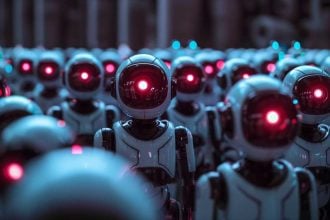Once a mere novelty, chatbots are now integral to many sectors, from customer service to healthcare. The recruitment industry is no exception. While AI enhances efficiency in hiring, it also raises important questions about the future role of human recruiters.
In recent years, the recruitment landscape has been significantly transformed by the rise of AI-powered tools and technologies are becoming more prevalent in the hiring process, from screening candidates to conducting initial interviews.
Companies are increasingly deploying AI-driven interview platforms to streamline the hiring process, hoping to save time, reduce bias, and enhance efficiency. But as we stand on the brink of this transformation, one must ask: can a chatbot really capture the nuances of human potential?
Recruiters and HR departments are clearly leveraging bots to their advantage, and it’s time for job seekers to follow suit. Chatbots can assist with interview preparation and provide valuable feedback; tools like Siri, Cortana, and Google Assistant have been available for some time now.
On another front, CV bots can significantly boost a job seeker’s chances of landing interviews. A notable example is Estherbot, created by Esther Crawford, which engages with multiple hiring managers on behalf of candidates.
Last year, Crawford received eight job interview offers thanks to Estherbot, leading her to launch a startup aimed at helping others develop their own CV bots.
The Experience of the Interviewee
For job seekers, the prospect of being interviewed by a chatbot can evoke a mix of intrigue and anxiety.
On one hand, there’s the appeal of a non-judgmental interviewer that won’t fumble through questions or misinterpret your responses.
On the other hand, there’s the fear of losing the human connection that many feel is crucial to a successful interview.
Imagine the chatbot, equipped with an expansive database of your resume and behavioral cues. It might begin with a straightforward prompt: “Tell me about a time you overcame a challenge.”
You respond with a well-prepared anecdote, only to have the chatbot follow up with an unexpected twist, probing deeper into your emotional responses.
How would it interpret your body language? Your tone? While a human might pick up on subtle cues like nervousness or enthusiasm, can a chatbot truly understand what lies beneath your words?
Predictive Hiring
AI algorithms can analyze historical hiring data to forecast which candidates are most likely to excel in specific roles. This enables recruiters to make more informed decisions and minimizes the risk of poor hires.
The benefits are substantial: a study by Aberdeen Group found that companies utilizing predictive analytics in their recruitment processes experienced a 50% reduction in time-to-hire and a 40% decrease in cost-per-hire.
The Algorithmic Bias
Then there’s the issue of bias. Many worry that while chatbots may reduce some human biases, they could introduce new ones—after all, they learn from data that reflects historical prejudices.
If a chatbot is programmed to prioritize certain skills or backgrounds based on past hiring trends, we could inadvertently perpetuate inequities rather than eliminate them. As we transition to a tech-driven interview landscape, how do we ensure that these algorithms are fair and inclusive?
Interview Assistance
AI-powered virtual interviewers can handle initial screenings, allowing recruiters to concentrate on more complex and nuanced aspects of the hiring process.
A survey by Gartner reveals that 38% of companies are already utilising AI for virtual interviews, and this trend is anticipated to expand in the coming years.
The Question of Emotional Intelligence
One of the greatest challenges for chatbot interviews is the question of emotional intelligence. A crucial aspect of any job, especially those involving teamwork and collaboration, is the ability to connect with others.
Can a chatbot gauge empathy, adaptability, and cultural fit in the same way a human interviewer can? While it might excel at evaluating hard skills, the subtleties of human interaction may remain elusive.
The Future of Recruitment Consultants?
In essence, AI has the potential to significantly streamline the recruitment process. However, as with any new technology, there are valid concerns about its impact on the industry—highlighted by 17% of our LinkedIn audience in a recent poll.
Key issues include the risk of perpetuating existing biases and safeguarding candidate privacy. It’s essential for the industry to collaborate in addressing these challenges and to implement AI in a responsible and ethical way.
A New Kind of Preparation
For job seekers, preparing for a chatbot interview would likely differ from traditional methods. Gone would be the days of rehearsing answers in front of a mirror. Instead, candidates might focus on practicing clarity and coherence in their speech, ensuring that their thoughts can be accurately processed by AI.
The interview prep industry could even see a rise in specialized coaching for “AI interviews,” altering the landscape of career services as we know it.
Embracing the Hybrid Model
As we navigate this evolving landscape, it seems that a hybrid model might be the most effective approach. Imagine a scenario where chatbots conduct the first round of interviews, sifting through applications and filtering candidates based on objective criteria.
Human interviewers could then take over for subsequent rounds, focusing on the emotional and interpersonal skills that machines struggle to measure.
Personalised job matches
AI algorithms can analyse a candidate’s data and suggest jobs that align with their skills, experience, and personal preferences.
It’s not just a nice touch – according to a report by the Harvard Business Review, companies that personalize their recruitment process see a 50% increase in candidate satisfaction and a 25% increase in application completion rates.
Conclusion: A Brave New World
Ultimately, the question of whether we’re ready to embrace chatbot interviews invites deeper reflection on the nature of work itself.
Given the ups and downs,, it’s uncertain whether AI chatbots will become the standard in job interviews. While robot interviewers are likely to become more prevalent in the coming years, companies may reconsider their investments based on the outcomes of this initial rollout.
Chatbot-conducted interviews are already a reality. What started with businesses employing AI to sort through resumes and assist applicants with onboarding has evolved into fully automated assessments. As the practice gains traction, it could have intriguing implications for the future of hiring.







